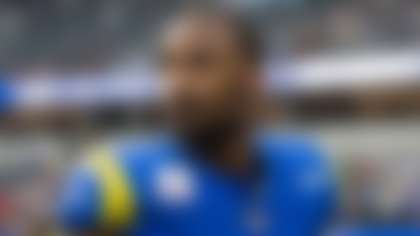Tuesday's trade of Chandler Jones to Arizona was a rarity in so many ways. It came out of nowhere, includes a big-name young star, and it makes a lot of sense for both teams.
There simply aren't many trades in NFL history that include two of the best teams in the NFL and one of the league's most productive young pass rushers. The Patriots received a former top-10 pick (guard Jonathan Cooper) and a second-round pick in exchange for Jones, although the compensation was only part of the equation.
So why did the Patriots trade Jones?
He was going to cost too much
Jones was due "only" $7.79 million in 2016, the final year of his rookie deal. While that number was fourth highest on the Patriots' roster, it is a reasonable figure for someone with 36 career sacks in 55 games. The problem was going to hit in 2017. Olivier Vernon's five-year, $85 million contract with the New York Giants sent a chill through front offices around the league with young pass rushers. If Vernon is worth $52 million in guarantees, Jones should get more. And he probably will from the Cardinals.
This deal only makes sense for Arizona if it locks up Jones to a long-term contract. The Cardinals are desperate for a pass rusher that can win one-on-one matchups and Jones provides that. But Jones is not worth a second-round pick and Cooper unless the Cardinals have him for more than one season. The Patriots knew Jones' time in New England was short.
Jones was low on Patriots' priority list
After a lull in finding defensive cornerstones in the draft, coach Bill Belichick started hitting on players again in 2012. Now they have good problems in deciding who to keep. Dont'a Hightower and Jamie Collins are both entering contract years, and it would have been impossible for the Patriots to re-sign both players and Jones. Cornerback Malcolm Butler is also due a new contract as a potential restricted free agent in 2017. Hightower is a Belichick favorite, an intelligent and versatile linebacker who would fit right in with the early 2000s Patriots linebacker core.
Collins, along with Jones, is one of the freakiest athletes in the NFL. He can rush the passer, pursue running backs, and cover tight ends down the field (unless that tight end is named Owen Daniels). Collins' versatility allows Belichick to get creative with his front seven and would theoretically be harder to replace than Jones. As a pass rusher with big sack numbers, Jones' contract negotiations also figured to get complicated.
Still, Jones was New England's best pure pass rusher. He could do it from defensive end, linebacker or defensive tackle. The Patriots probably feel they can get by with their depth at defensive end. Jabaal Sheard was very effective last year as a free-agent pickup and Rob Ninkovich remains a key player. They further bolstered the position Tuesday by agreeing to terms on a one-year deal with veteran Chris Long. The Patriots also selected two defensive ends in the middle rounds of the draft last year. The Patriots essentially just chose to minimize the damage of Jones' inevitable departure, getting something while they could.
They need the draft pick
The Patriots had their first-round draft pick taken away as part of their Deflategate penalty, so Arizona's second-round pick gives them additional ammunition to replace Jones in the draft. The Patriots now have four picks in the top 100: No. 60, No. 61, No. 91 and No. 96 -- that last one is a compensatory pick.
The Patriots could have squeezed another season out of Jones and expected a late third-round compensatory pick back if he left as a free agent next year. But that calculation gets complicated; the compensatory pick could be offset if the Patriots signed any big free agents. Instead, the Patriots get a pick one round higher and Cooper in return.
It's hard to know how much value Cooper has. The Patriots need interior line help, but the No. 7 overall pick of the 2013 draft has barely played as a pro because of injuries and ineffectiveness. He was workmanlike in 2015. He's a flier, albeit one with upside.
Jones' issues
Chandler Jonesapologized in January for making a "stupid mistake" in the week before the Patriots' playoff game against Kansas City. NFL Media Insider Ian Rapoport reported that Jones had a bad reaction to synthetic marijuana.
Jones showed up at a nearby police station according to a police report with his shirt off. Jones was never known as a difficult player to coach, but the incident certainly didn't help his chances of getting another contract in New England.
There was also occassional grumbling in New England that Jones was an inconsistent player. He had stretches of dominance followed by periods of quiet. That's typical of many good, but not great pass rushers. Jones played a ton of snaps, but Pro Football Focus never ranked him as a truly elite pass rusher.
We believe Jones' athleticism and sheer talent make him more valuable than the numbers above. The Cardinals have only had one player with 10-plus sacks in the last 11 years. Jones has done it twice, and could thrive on a talented Arizona defense.
This is a rare trade in many ways, and it could wind up being even rarer in retrospect: A win for both teams.












